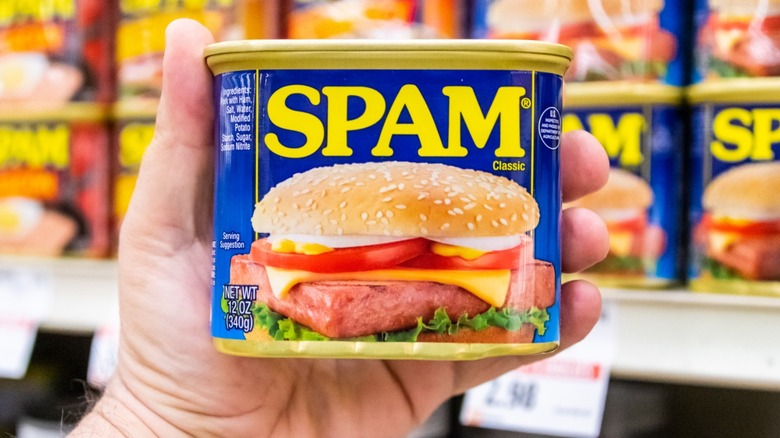The Truth About What's Really In Spam
When it comes to canned meats, it probably comes as no surprise that Spam tops the U.S. market. According to Statista, nearly 59 million Americans consumed Spam in 2020.
Produced by Hormel Foods, Spam was invented under the leadership of Jay C. Hormel, also known as "the SPAM Man" (via Atlas Obscura). Spam hit the market in 1937 as the only canned meat that did not require refrigeration. A powerful advertising campaign made Spam a popular staple among homemakers, but the product really hit its stride in World War II when over 150 million pounds were used by American troops serving in countries around the world. Because troops introduced the product to the locals where they were stationed, Spam became part of the diets of various countries across the globe (via Smithsonian).
When World War II ended, Jay C. Hormel knew he needed to find new ways to keep Spam top of mind in American households. This inspired him to create "the Hormel Girls" — sometimes referred to as "the Spamettes" — a band of female bugle players from the war who marketed Spam. By the mid-1950s, sales of Spam in the U.S. doubled. The beloved canned meat has remained a staple ever since (via Atlas Obscura).
How healthy is Spam?
But what exactly is Spam? And is it healthy? It turns out Spam is comprised of only six ingredients: pork with ham meat, potato starch, sugar, salt, water, and sodium nitrite. Initially designed as an affordable meat product during the Great Depression that you could keep in the pantry for a long time and easily add to a meal, Spam is now used in a variety of cuisines across the globe (via Hormel Foods). People today add Spam to fried rice dishes, burritos, egg dishes, pizza, sushi, and the list goes on (via Food Network).
While Spam is likely to remain a permanent fixture on grocery shelves, to maintain a healthy diet, it's not a product you should eat regularly. This is because Spam is very high in fat and sodium and low in nutrients. The sodium nitrite it contains to keep the meat preserved could also have adverse health effects over time. So go ahead and enjoy your Spam sushi, but also be sure to incorporate healthier proteins into your meals such as fresh meat and poultry whenever possible (via Healthline).

